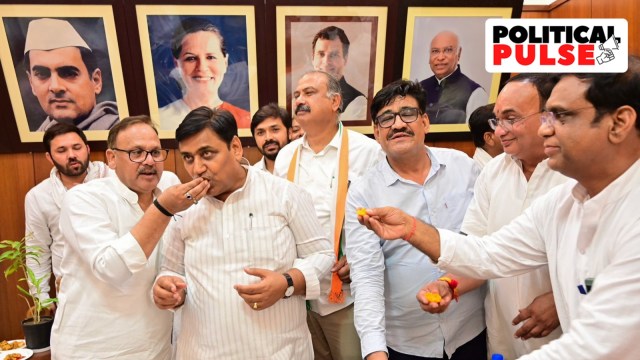Congress back from the brink in Rajasthan, beats own expectations on back of Jat unrest, gains among SCs & STs
The Congress also seems to have gained from early voting phases, when there was perhaps more perceptible saturation with the BJP and PM Modi.
 Jaipur: Rajasthan Congress chief Govind Singh Dotasra with party leader celebrates their gain in Lok Sabha polls during counting of votes, in Jaipur, Tuesday, June 4, 2024. (PTI Photo)
Jaipur: Rajasthan Congress chief Govind Singh Dotasra with party leader celebrates their gain in Lok Sabha polls during counting of votes, in Jaipur, Tuesday, June 4, 2024. (PTI Photo)After being wiped out from Rajasthan in two straight Lok Sabha elections, the Congress has breached the BJP stronghold and surpassed its own expectations in the process.
Rajasthan had given all 25 Lok Sabha seats to the BJP and the NDA in 2014 and 2019, respectively. This time, Congress won eight seats and its three alliance partners were victorious in a seat each. The BJP swept up the remaining 14.
The last time Congress won a Lok Sabha seat in Rajasthan was in 2009, when it won 20 seats and the party formed the second UPA government under Prime Minister Manmohan Singh.
While the official stance of the Congress was that it would win 12-13 seats, its leaders were hopeful of winning 5-6 seats. Poll punters, too, were willing to give Congress a maximum of seven seats on its own.
Although the final figures were yet to come in, BJP vote share dipped around 9 per cent compared to 2019, with the Congress-led alliance registering gains.
The BJP was banking on Prime Minister Narendra Modi’s appeal, the Ram Temple construction, removal of Article 370 from Jammu and Kashmir, a perception about India’s “powerful” image abroad, rallies by party heavyweights and a consolidation of its power through inductions from other parties.
The Congress, meanwhile, was relying on Jat anger against BJP, anti-incumbency and coalitions to dent BJP’s aim to win all 25 seats from the state for the third time.
Apart from the Jat-dominated Shekhawati region, the Congress performed well in the eastern Rajasthan pockets dominated by the Gujjar–Meena communities and Scheduled Castes (SC). In Shekhawati, the Congress wasted no time in fielding BJP rebel Rahul Kaswan, a Jat, from Churu. The sitting MP had been denied a ticket by the BJP.
As BJP’s seven-term former MLA Rajendra Rathore, a Rajput, made it a battle of prestige here, the election was sharply divided along caste lines in the region and had reverberations beyond: In Barmer, Congress’s Ummeda Ram, a Jat, won against Ravindra Bhati, a Rajput, even though Jat vote was divided between Ummeda Ram and BJP’s sitting Union Minister Kailash Choudhary. Five of the Congress-led alliance’s winning candidates are Jats, while three each are from Scheduled Tribes (STs) and SCs.
Moreover, Congress state chief Govind Singh Dotasra — who hails from Sikar in the Jat heartland — has carved out his own image over the last year or so, separate from former chief minister Ashok Gehlot.
A number of additional factors, too, seemed to have worked for Congress — unrest among farmers, the anger over the Agniveer scheme, the denial of CM or deputy CM post to a Jat leader and the sidelining of “Jat ki bahu” Vasundhara Raje as well as former BJP state chief Satish Poonia, the party’s first and only Jat state president. As a result, the Opposition party was comfortable in Sikar, Churu, Jhunjhunu and Nagaur seats.
In eastern Rajasthan, the Gujjar-Meena combine again worked in favour of the Congress after more than five years. In the 2023 Assembly polls, too, the Congress had performed fairly well in the region but nowhere close to 2018, when the BJP was almost swept away from the region.
On Tuesday, Congress’s Harish Chandra Meena won from Tonk-Sawai Madhopur, Murari Lal Meena from Dausa, Bhajan Lal Jatav from Karauli–Dholpur and Sanjana Jatav from Bharatpur.
The region is considered a stronghold of Sachin Pilot and BJP cabinet minister Kirodi Lal Meena. Much was at stake for both leaders, with Meena even stating that he would resign if BJP loses Dausa.
Later, he said that if the BJP lost any of the seven seats in eastern Rajasthan he would resign. With Congress winning four of these, Meena hinted on social media site X that he would indeed resign.
Both Harish Meena and Murari Meena — as well as Brijendra Ola in Shekhawati’s Jhunjhunu — among others, are considered close to Pilot. Harish and Murari directly gained from the Gujjar-Meena unity in the region. In Dholpur, Bhajan Lal Jatav faced an uphill battle as he originally hails from Bharatpur and has been contesting from there. He had lost last year’s Assembly election and was moved out of his home district.
Congress was banking on Jat anger in Bharatpur, too, and the BJP made an all-out effort to retain this seat as it became a question of prestige — Chief Minister Bhajan Lal Sharma hails from the constituency. The Jats of Bharatpur and Dholpur have been seeking inclusion in the Central OBC list. Chief Minister Sharma has himself said that the state is pursuing the issue and has indicated that there will be positive results. However, Sanjana Jatav, 25, who had lost the December Assembly election by just 409 votes, put up a spirited campaign and won this seat.
After the impressive Congress performance in Shekhawati and eastern Rajasthan, Dotastra and Pilot will likely see their political capital rise. While Dotasra was the tip of the arrow in Congress’s plans in Shekhawati and beyond as it sought to capitalise on Jat unrest, Pilot attended more than 100 public meetings in 53 Lok Sabha seats across 14 states.
And the party’s three allies clicked too — Rashtriya Loktantrik Party’s Hanuman Beniwal (Nagaur), CPM’s Amra Ram (Sikar) and Bharat Adivasi Party’s Raj Kumar Roat (Banswara) won their respective seats.
Beniwal’s RLP is considered a Jat party, a factor that helped the Congress consolidate its votes in the community, apart from support from the SCs, the STs, the Muslims and the backward communities.
The Congress also seems to have gained from early voting phases, when there was perhaps more perceptible saturation with the BJP and PM Modi. All 25 Rajasthan seats had voted in the first two phases of the long election. Perhaps sensing a churn, PM Modi had led his party’s offensive, even making controversial statements in Banswara and Tonk–Sawai Madhopur Lok Sabha seats. These statements were made after the polling for the first round had been completed. Religious polarisation, however, seemed to have had limited impact and the BJP lost both these seats.
The BJP still managed to win a comfortable 14 seats, though with reduced margins in some seats. For instance, Lok Sabha Speaker Om Birla, who had won over 58 per cent of the vote in 2019 in Kota, was leading by 41,000 against BJP rebel-turned-Congress candidate Prahlad Gunjal.
In Alwar (Bhupender Yadav) and Bikaner (Arjun Ram Meghwal), the party had a lead of close to 50,000 — down from 2019. But in six constituencies — Ajmer, Bhilwara, Chittorgarh, Jaipur, Jhalawar Baran, and Rajsamand — its margin was more than 3 lakh votes.
While former CM Ashok Gehlot’s son Vaibhav Gehlot lost from Jalore, Gehlot senior could take heart from the party’s win in Gandhi family’s pocket boroughs of Rae Bareli and Amethi, where he had campaigned extensively.





- 01
- 02
- 03
- 04
- 05


























